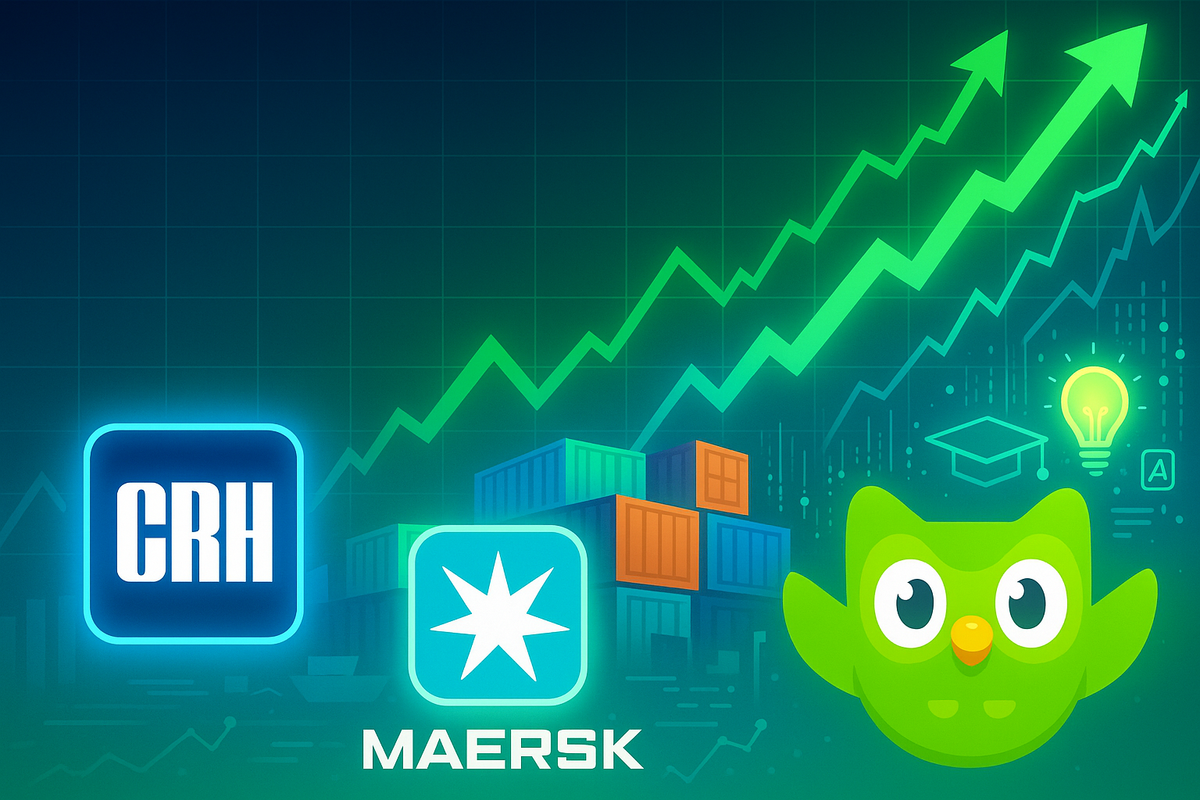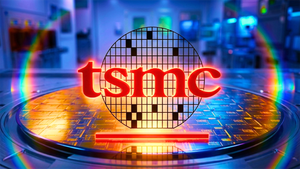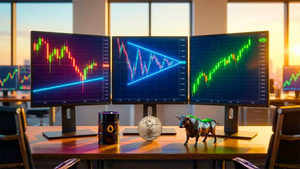Financial News
Strong Earnings and Raised Guidance Propel CRH, Maersk, and Duolingo Shares Amidst Market Optimism

In a significant boost to market sentiment, several prominent companies have recently reported robust earnings and, crucially, raised their financial guidance for the coming periods. This wave of positive corporate news, particularly from industrial giant CRH, shipping behemoth Maersk, and ed-tech innovator Duolingo, has ignited investor confidence, leading to notable surges in their respective share prices and contributing to a broader sense of optimism across global markets.
These strong performances underscore a resilient corporate landscape, even amidst ongoing economic uncertainties. The ability of these diverse companies to not only meet but exceed expectations, and to project continued growth, provides a compelling narrative for investors seeking stability and potential returns in a dynamic environment.
What Happened and Why It Matters
The recent flurry of positive earnings reports and upward revisions to financial guidance from key players like CRH, Maersk, and Duolingo has sent ripples of optimism through the financial markets. These announcements are not merely isolated incidents but rather significant indicators of underlying strength within specific sectors and, by extension, the broader economy. When companies demonstrate strong operational performance and express confidence in their future prospects, it often translates into increased investor appetite and a more bullish market outlook.
CRH (NYSE: CRH), the global leader in building materials, reported a robust second quarter for 2025, with revenue climbing 5.7% year-over-year to $10.21 billion and adjusted EBITDA increasing by 9% to $2.5 billion. This strong performance was underpinned by favorable demand and positive pricing momentum across all business lines, particularly in aggregates and cement. The company's strategic acquisitions, including the $2.1 billion purchase of Eco Material Technologies, significantly contributed to revenue growth. Consequently, CRH raised its full-year 2025 adjusted EBITDA guidance to a range of $7.5 billion to $7.7 billion, reflecting confidence in achieving a 20% margin. As the largest roadbuilder in the US, CRH is a direct beneficiary of accelerating US infrastructure spending, further solidifying its positive outlook.
A.P. Moller - Maersk (CPH: MAERSK-B), the Danish shipping and logistics giant, also delivered a strong Q2 2025, with consolidated revenue reaching $13.1 billion, a 2.8% increase from the previous year. Underlying EBITDA rose 7% year-on-year to $2.3 billion, surpassing analyst expectations. The Ocean division saw a 2.4% revenue increase driven by higher volumes, while the Logistics & Services segment continued its margin recovery. Maersk's Terminals division was a standout, with a 20% increase in revenue. The company subsequently raised its full-year 2025 underlying EBITDA guidance to between $8 billion and $9.5 billion. This optimistic revision is attributed to resilient market demand outside North America, strong Q2 performance, and the successful phasing in of the Gemini Cooperation, a vessel-sharing alliance with Hapag-Lloyd, which has improved operational reliability and cost optimization. The ongoing Red Sea disruptions, leading to longer sailing times and higher freight rates, have also played a role in boosting earnings.
Meanwhile, Duolingo (NASDAQ: DUOL), the popular language-learning platform, reported an impressive Q2 2025, with earnings per share (EPS) of $0.91, significantly exceeding consensus estimates. Revenue surged by 41.5% year-over-year to $252.27 million, driven by substantial user growth and increased engagement. Daily Active Users (DAUs) increased by 40% to nearly 48 million, and paid subscribers rose 37% to 10.9 million. Duolingo raised its full-year 2025 revenue forecast to between $1.01 billion and $1.02 billion. This positive trajectory is fueled by strong user growth, enhanced monetization of premium offerings, and the successful implementation of AI-driven features like Duolingo Max, which offers video conversation practice tools. The company's strategic expansion into new subjects like chess, math, and music has also contributed to its robust performance.
These individual company successes collectively paint a picture of a market where innovation, strategic execution, and adaptability are being rewarded. The raised guidance from these diverse entities suggests a broader confidence in economic stability and growth, which is a significant driver of overall market optimism.
Winners and Losers in the Wake of Strong Earnings
The recent wave of strong earnings reports and raised guidance has created clear winners in the market, primarily the companies themselves and their shareholders. However, the ripple effects of such positive news can also influence competitors and related industries, creating a dynamic landscape of potential winners and losers.
CRH's (NYSE: CRH) robust performance and optimistic outlook position it as a significant winner. Shareholders have seen their investments appreciate as the company's stock price surged following the announcements. The company's strategic acquisitions and its role as a key beneficiary of accelerating US infrastructure spending further solidify its market position. This strength could put pressure on smaller, less diversified building materials companies that may struggle to compete with CRH's scale and efficiency. However, it could also signal a healthy construction sector, potentially benefiting suppliers of raw materials and construction equipment.
Maersk's (CPH: MAERSK-B) strong results and raised guidance are a clear win for the shipping giant and its investors. The company's ability to navigate geopolitical challenges and capitalize on resilient demand highlights its operational prowess. The increased freight rates due to Red Sea disruptions, while a challenge for global supply chains, have undeniably boosted Maersk's earnings. This situation could be a disadvantage for companies heavily reliant on international shipping, as they face higher transportation costs. However, it could also spur innovation in logistics and supply chain management, potentially benefiting technology providers in this space. Competitors in the shipping industry that are less agile or have less diversified operations might find themselves at a disadvantage, struggling to match Maersk's efficiency and network.
Duolingo's (NASDAQ: DUOL) impressive growth in users and revenue, coupled with its raised guidance, makes it a standout winner in the ed-tech sector. The company's innovative use of AI and its expansion into new learning subjects have clearly resonated with users. This success could pose a challenge for traditional language learning institutions and smaller ed-tech startups that lack Duolingo's resources for AI development and content diversification. However, Duolingo's success also validates the broader online learning market, potentially attracting more investment and innovation into the sector, which could benefit other ed-tech companies that offer complementary services or cater to niche markets.
In essence, the "winners" are those companies demonstrating strong fundamentals, strategic foresight, and adaptability to market conditions. The "losers," if any, are likely to be those unable to keep pace with these industry leaders or those negatively impacted by the broader economic shifts that these strong performers are capitalizing on.
Industry Impact and Broader Implications
The strong earnings and raised guidance from CRH, Maersk, and Duolingo are not isolated events; they offer valuable insights into broader industry trends and carry significant implications for the wider economy. These performances suggest a nuanced but generally positive outlook, highlighting areas of resilience and growth.
CRH's (NYSE: CRH) success underscores the robust demand within the construction and infrastructure sectors, particularly in the United States. This aligns with broader trends of increased government spending on infrastructure projects and a continued need for housing and commercial development. The company's strategic acquisitions also point to a trend of consolidation within the building materials industry, as larger players seek to expand their market share and achieve greater economies of scale. This could lead to a more concentrated industry landscape, potentially impacting smaller, independent operators. Furthermore, CRH's focus on sustainable building solutions and its acquisition of Eco Material Technologies reflect a growing industry emphasis on environmentally friendly practices and materials, a trend that is likely to accelerate due to regulatory pressures and consumer demand.
Maersk's (CPH: MAERSK-B) strong performance, despite ongoing geopolitical disruptions like the Red Sea crisis, highlights the critical role of global logistics and supply chain resilience. The increased freight rates, while beneficial to Maersk's bottom line, underscore the fragility of global supply chains and the potential for external events to significantly impact trade. This situation could accelerate the trend towards nearshoring or reshoring of manufacturing, as companies seek to reduce their reliance on long and vulnerable supply routes. It also emphasizes the importance of diversified shipping routes and the adoption of advanced logistics technologies to mitigate risks. The Gemini Cooperation, Maersk's alliance with Hapag-Lloyd, exemplifies a broader industry trend towards strategic partnerships and collaborations to optimize networks and improve efficiency in a volatile environment.
Duolingo's (NASDAQ: DUOL) impressive growth in user engagement and monetization, particularly through AI-driven features and diversification into new subjects, signals a significant shift in the education technology (ed-tech) landscape. This success validates the efficacy of gamified learning and personalized educational experiences powered by artificial intelligence. The rapid adoption of Duolingo's new offerings, such as chess and music, suggests a vast untapped market for accessible, engaging, and diverse online learning content. This trend could put pressure on traditional educational institutions to adapt their teaching methodologies and embrace digital tools. It also highlights the increasing importance of lifelong learning and skill development in a rapidly evolving job market. Regulatory bodies may also begin to scrutinize the data privacy and ethical implications of AI in education as these platforms become more pervasive. Historically, similar technological advancements have often led to a democratization of access to information and skills, and Duolingo's trajectory appears to be following this pattern.
Collectively, these company performances suggest a market that is rewarding innovation, strategic adaptation, and a keen understanding of evolving consumer and industry needs. They also highlight the interconnectedness of global markets, where events in one sector can have far-reaching implications across others.
What Comes Next
The strong earnings reports and raised guidance from CRH, Maersk, and Duolingo set a compelling stage for what comes next, both for these individual companies and the broader market. The short-term outlook appears positive, with continued investor confidence likely to fuel further interest in these stocks. However, the long-term trajectory will depend on their ability to sustain growth, adapt to evolving market dynamics, and capitalize on emerging opportunities.
For CRH (NYSE: CRH), the immediate future will likely see continued leveraging of the robust US infrastructure spending. The company's strategic acquisitions suggest a proactive approach to expanding its market footprint and product offerings. In the long term, CRH will need to navigate potential shifts in construction demand, commodity price volatility, and increasing pressure for sustainable building practices. This may involve further investments in green technologies and materials, as well as exploring new markets beyond its traditional strongholds. Potential strategic pivots could include deeper integration of digital solutions in construction management and supply chain optimization to enhance efficiency and reduce costs.
Maersk (CPH: MAERSK-B) faces a complex but potentially rewarding future. While the Red Sea disruptions have temporarily boosted freight rates, the long-term stability of global supply chains remains a key concern. Maersk's focus on operational efficiency through initiatives like the Gemini Cooperation will be crucial for maintaining profitability in a potentially more normalized shipping environment. The company may also explore further diversification into integrated logistics solutions, offering end-to-end supply chain management to clients. Challenges include managing geopolitical risks, adapting to evolving trade policies, and investing in decarbonization technologies to meet environmental targets. Market opportunities could emerge from increased demand for resilient and agile supply chains, potentially leading to new service offerings and partnerships.
Duolingo (NASDAQ: DUOL) is poised for continued expansion, particularly with its successful foray into new subjects beyond language learning. The company's reliance on AI for personalized learning and content creation will be a key differentiator. Short-term possibilities include further monetization of its growing user base through premium features and partnerships. In the long term, Duolingo could become a broader educational platform, offering a wide array of subjects and potentially even accredited courses. Strategic adaptations might involve deeper integration with educational institutions and corporate training programs. Challenges include maintaining user engagement amidst increasing competition, ensuring the quality and accuracy of AI-generated content, and navigating potential regulatory frameworks around AI in education. The market opportunity for accessible, engaging, and affordable online education remains vast, and Duolingo is well-positioned to capture a significant share.
Across all three companies, the ability to innovate, manage costs effectively, and respond swiftly to market shifts will be paramount. Investors should watch for continued strong financial performance, strategic investments in growth areas, and how these companies address potential headwinds in their respective sectors. The overall market will likely continue to be influenced by these bellwether companies, with their successes potentially signaling broader economic health and investor confidence.
Conclusion
The recent wave of strong earnings reports and raised guidance from CRH (NYSE: CRH), Maersk (CPH: MAERSK-B), and Duolingo (NASDAQ: DUOL) serves as a powerful testament to corporate resilience and strategic foresight in a dynamic global economy. These individual successes, spanning diverse sectors from building materials to shipping and ed-tech, collectively paint a picture of underlying market strength and renewed investor optimism.
The key takeaways from these announcements are multifaceted. Firstly, they highlight the importance of robust fundamentals and effective operational management in driving profitability, even amidst external challenges. CRH's ability to capitalize on infrastructure spending, Maersk's navigation of complex geopolitical landscapes, and Duolingo's innovative use of AI all underscore the value of adaptability and strategic execution. Secondly, the raised guidance from these companies signals a forward-looking confidence in sustained growth, which is a crucial driver of positive market sentiment. This suggests that despite ongoing uncertainties, there are significant pockets of economic strength and opportunity.
Moving forward, the market will likely continue to be influenced by these bellwether companies. Their continued performance will serve as an indicator of broader economic health and investor appetite for growth. For investors, the coming months will be critical for observing how these companies execute on their raised guidance, manage potential headwinds, and continue to innovate within their respective industries. The lasting impact of these strong reports could be a reinforcement of the belief that well-managed companies with clear growth strategies can thrive even in challenging environments, potentially encouraging further investment in sectors demonstrating similar resilience and innovation. The focus will now shift to how these companies leverage their current momentum to solidify their market positions and deliver long-term value to shareholders.
More News
View More




Recent Quotes
View MoreQuotes delayed at least 20 minutes.
By accessing this page, you agree to the Privacy Policy and Terms Of Service.



